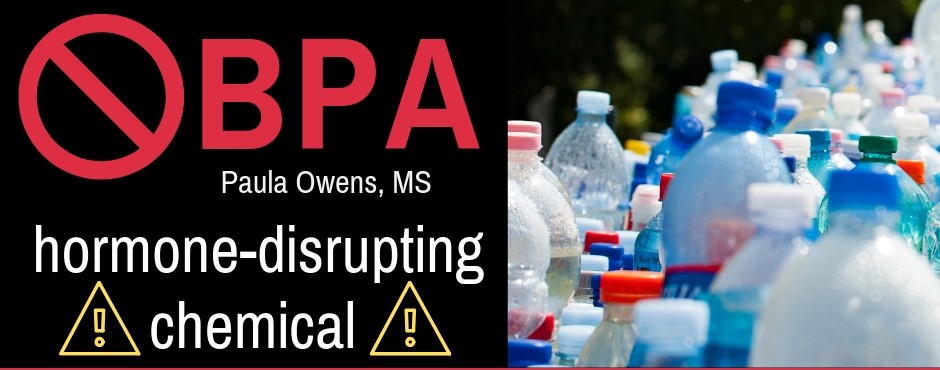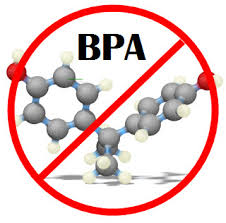Educating and Empowering You to Heal, Thrive, and Live a Happy, Healthy Lifestyle
Bisphenol-A (BPA), a Hormone-Disrupting Chemical
 Bisphenol-A (BPA) is a synthetic, hormone-disrupting chemical that mimics estrogen. BPA is found in many everyday items including plastic water bottles, the lining in canned foods and beverages, thermal cash register receipts, and hundreds of other everyday products.
Bisphenol-A (BPA) is a synthetic, hormone-disrupting chemical that mimics estrogen. BPA is found in many everyday items including plastic water bottles, the lining in canned foods and beverages, thermal cash register receipts, and hundreds of other everyday products.
BPA is detectable in the bodies of more than 95% of the population.
BPA activates estrogen receptors, disrupting hormones and affects how estrogen and other hormones act in the body by blocking them or mimicking them, which throws off the body’s entire hormonal balance. It has been found to cause estrogenic changes in animal cells at the same concentrations that are found in pregnant women and their fetuses.
Endocrine disrupting chemicals have been renamed metabolism disrupting chemicals because they not only disrupt hormones, they also disrupt nuclear receptor sites in the nucleus of the cell.
Is BPA-free a safer option? Anything’s that labeled BPA-free can be legally BPS or BPF (also endocrine disruptors). BPS appears to have more estrogen disrupting activity than BPA does.
Sources of Bisphenol-A, (BPA)
- The main sources of BPA in humans is from residues in food that leach out of polycarbonate and resin packaging
- Food storage containers
- Plastic bottles
- Canned foods and canned beverages
- Dental sealants, dental retainers
- Plastic utensils
- Household dust
- Thermal cash register receipts
- Children’s toys and pacifiers
- Pet toys
- Breast implants
- Plastic wrap and packaging
- Compact disks
- Smartphones
- Personal care products including makeup
- Adhesives
 Pregnant women and children are especially sensitive and vulnerable to BPA exposure. They should avoid exposure to plastics, thermal receipts, canned foods and beverages.
Pregnant women and children are especially sensitive and vulnerable to BPA exposure. They should avoid exposure to plastics, thermal receipts, canned foods and beverages.
In January 2010, the U.S. Food and Drug Administration announced that they have concerns about the chemical’s potential affects on brain development of fetuses, infants and children.
In yet another study [Environmental Health Perspectives], 94% of pregnant women in the study had detectable levels of BPA. This study found that prenatal exposure to BPA puts her baby on course to obesity.
A 2006 study in the journal Chemistry & Biology found a link between BPA and breast cancer.
BPA, a Harmful Hormone-Disrupting Chemical
Health Risks Linked to BPA Exposure
- Cancer
- Thyroid autoimmunity (Hashimoto’s, Graves) and other autoimmune diseases
- Behavioral problems, ADD, ADHD
- Heart disease, carciometabolic problems
- Type 2 diabetes, insulin resistance
- Structural brain damage, neurological disorders including MS
- Enlarged prostate, prostate cancer
- Altered immune function
- Asthma
- Hypertension
- Infertility
- Weight loss resistance, obesity
- Congested liver, fatty liver
- Early puberty
- Anxiety, depression
- Estrogen dominance
Tips to Reduce your Exposure to BPA
Protect yourself and your family. Why take a chance when there are so many healthier alternatives?
Related Articles
- Video: Health News you can Use
- How to Reduce Estrogen Dominance
- Affects Your Weight, Brain, Hormones, Mood and Health
- The Health Hazards of Pesticides, GMOs and Glyphosate

